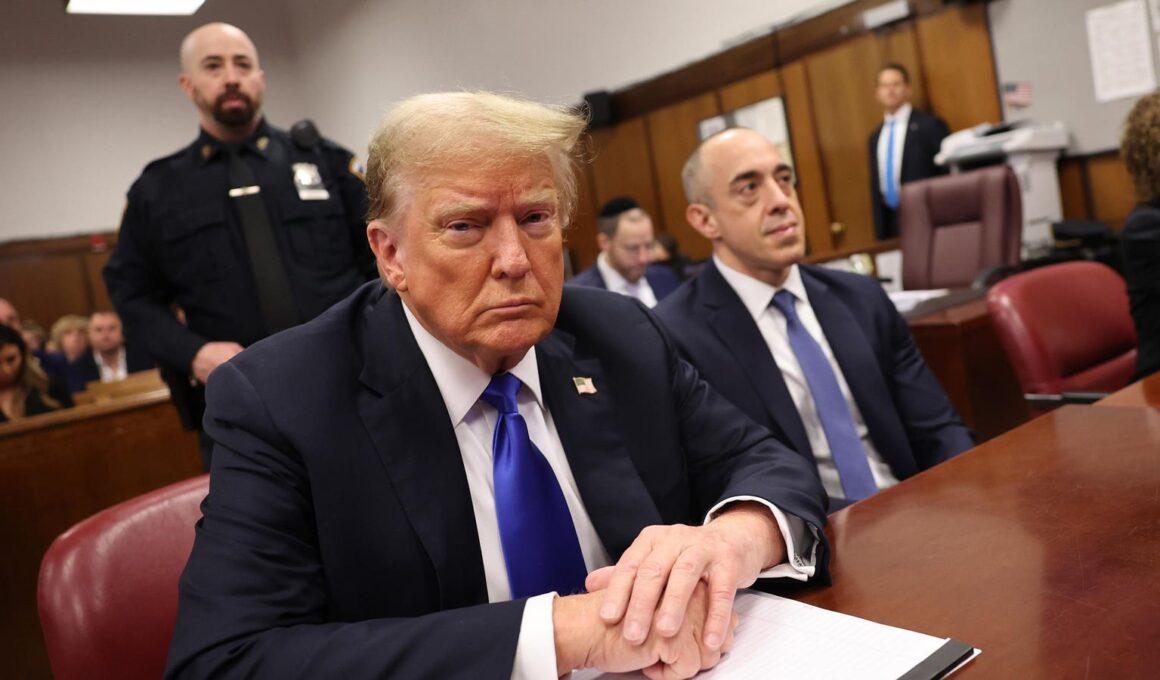Topline
The judge overseeing former President Donald Trump’s first criminal trial declined to recuse himself late Tuesday after Trump complained about his daughter’s work with Vice President Kamala Harris, keeping the case on track ahead of Trump’s sentencing next month—though the judge still has to rule on a request to throw out the verdict.
Former President Donald Trump attended a criminal trial at Manhattan Criminal Court on earlier this … [+]
Key Facts
Trump asked New York state Judge Juan Merchan to recuse himself from the case in July, arguing he should step aside because his daughter works for a company that’s provided services for Harris, who’s now the Democratic presidential nominee.
The ex-president has asked Merchan to step down over his daughter’s work before—which the judge has refused to do—but argued it’s even more necessary now that she’s directly running against Trump, claiming, “Decisions by Your Honor … would benefit not only Harris but also the professional aspirations and financial status of Your Honor’s daughter” and her company.
The Manhattan district attorney’s office argued Merchan should not recuse himself, claiming nothing substantial has changed from Trump’s previous requests for the judge to recuse over his daughter’s work and writing, “No amount of overheated, hyperbolic rhetoric can cure the fatal defects in defendant’s ongoing effort to impugn the fairness of these proceedings and the impartiality of this Court.”
Merchan rejected Trump’s request in a ruling late Tuesday, saying Trump’s third ask for him to step down “provided nothing new for this Court to consider,” and the ex-president’s lawyers “merely repeated arguments that have already been denied by this and higher courts.”
The judge also rejected Trump’s argument that he’s biased because of his daughter’s work, calling the ex-president’s claims that he and his daughter would benefit from Trump being hurt in court “unsubstantiated.”
Trump campaign spokesman Steven Cheung decried Merchan as “highly conflicted” in a statement Wednesday, saying the judge has “proved to be biased against President Trump and beholden to not only Democrat partisan interests, but also to the glaring financial interests of an immediate family member.”
Crucial Quote
“This Court now reiterates for the third time, that which should already be clear – innuendo and mischaracterizations do not a conflict create,” Merchan wrote. “Recusal is therefore not necessary, much less required.”
Chief Critic
Merchan “should have long ago recused himself from this case,” Cheung said Wednesday. “The whole Witch Hunt was rotten from the start and it should now be dismissed entirely as the partisan hoax that it is.”
What To Watch For
Merchan’s refusal to recuse keeps Trump’s case on track as it moves forward to sentencing. The judge is first set to rule September 16 on Trump’s motion to have the verdict thrown out because of the Supreme Court’s ruling giving ex-presidents some immunity from criminal charges for “official acts” in office. Trump argues that some of the evidence used at trial should not have been allowed under that ruling. If Merchan also declines that request, Trump will be sentenced on September 18, where he faces the possibility of prison time for the 34 felony counts he’s been convicted of—though legal experts are skeptical he would be sentenced to prison as a first-time offender.
Surprising Fact
Trump still can’t talk about his claims regarding the judge’s daughter in public, because even though the trial against him has ended, he remains bound by a gag order in the case. Merchan narrowed the gag order after the trial to allow Trump to speak about witnesses in the case, but the ex-president is still barred from speaking about court staff, prosecutors and family members of those involved with the case—a restriction that Merchan imposed specifically because of the attacks on the judge’s daughter. (Trump can talk about Merchan himself.) In the motion asking Merchan to recuse, Trump’s lawyers argued the gag order “prevents President Trump from engaging in Constitutionally protected speech” and is an “insidious” restraint on his speech. Merchan dismissed those arguments on Tuesday, writing Trump’s complaints about the gag order have nothing to do with the recusal request and “appear to be nothing more than an attempt to air grievances against this Court’s ruling,” adding it’s “difficult to rationalize how Defense Counsel can, in good faith, claim that the Order is unconstitutional.” Trump then pushed back on Truth Social Wednesday, falsely claiming Merchan had ruled on the gag order and complaining the gag order concerns “VERY IMPORTANT THINGS WHICH MUST BE BROUGHT TO LIGHT.”
Key Background
Trump was convicted in May on 34 felony counts for falsifying business records in Manhattan, the first of his four criminal cases to go to trial. The ex-president was indicted based on hush money payments his ex-attorney Michael Cohen made to adult film star Stormy Daniels ahead of the 2016 election, with Trump then reimbursing Cohen through a series of checks paid throughout 2017. Prosecutors argued those checks were falsely labeled as being for legal services, which Trump disputed. Trump pleaded not guilty to the charges, decrying them as a “witch hunt.” The ex-president has frequently lashed out at Merchan throughout his criminal case, suggesting the judge is biased against him, as Trump has done with many other judges and prosecutors in litigation against him. In addition to Merchan, a state appeals court also rejected Trump’s prior effort to have Merchan removed from the case before it went to trial, unswayed by Trump’s claims the judge’s rulings “are causing ongoing, irreparable constitutional harms to [Trump]
and the voting public and, if not stopped, will prevent [Trump] from receiving a fair trial.”
Further Reading








